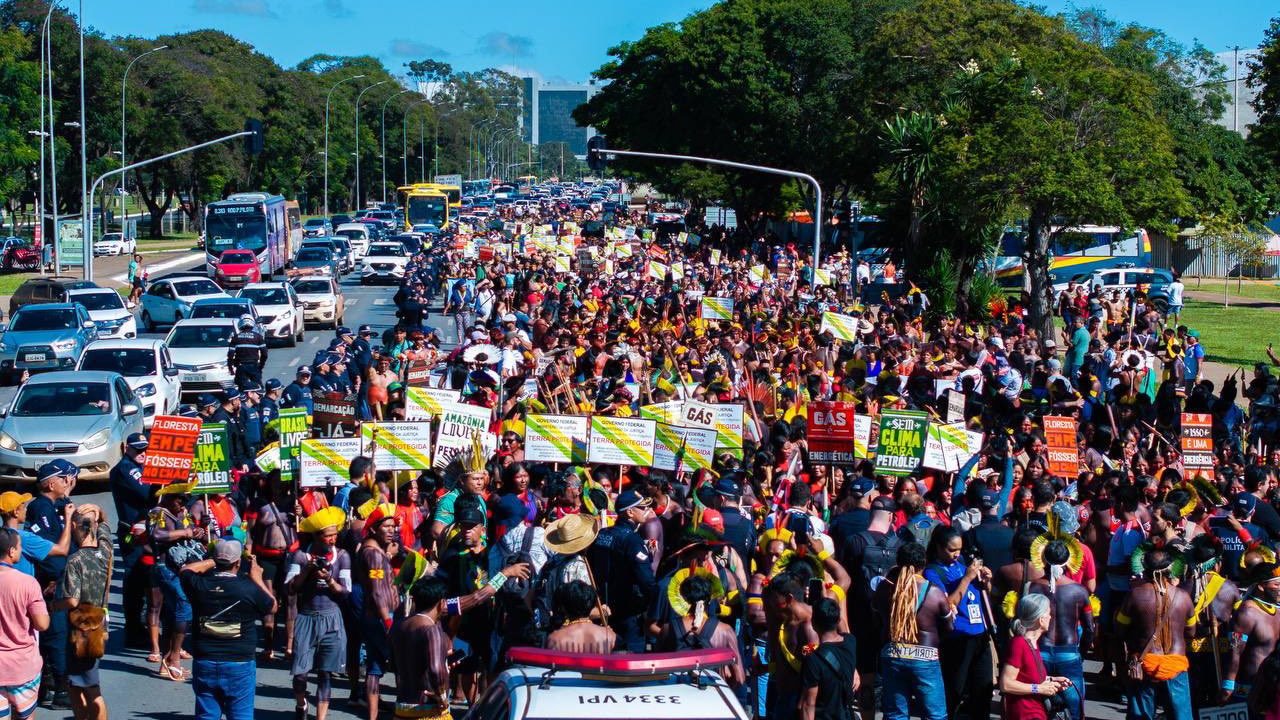Participants in the 20th Free Land Camp demanded that leftist Brazilian President Luiz Inácio Lula da Silva deliver on his promises to Indigenous people.
Apr 26, 2024
Thousands of people rallied this week in Brasília for the 20th annual Free Land Camp—the largest gathering of Indigenous people in Brazil—where participants demanded that President Luiz Inácio Lula da Silva’s administration safeguard their lands and cultural rights.
Organized by the Association of Brazil’s Indigenous Peoples (APIB), the five-day Free Land Camp—in Portuguese, Acampamento Terra Livre (ATL)—wrapped up Friday after a week of solidarity and action. Activities included rallies and marches; events commemorating slain Indigenous activists; and plenary sessions on the climate emergency, education, mental health, and more.
Some participants criticized Lula—who was notably absent from this year’s ATL after attending the previous two camps—for what they said was his failure to fulfill campaign promises to Indigenous Brazilians—although attendees also acknowledged that his administration has taken major steps toward tackling illegal resource extraction and demarcating tribal lands.
Two big issues at this year’s ATL—whose theme was “Our Existence is Ancestral: We Have Always Been Here!”—were the demarcation of Indigenous lands and opposition to proposed Amazon megaprojects, especially the plan to build the EF-170 railway through the heart of the imperiled rainforest in order to boost mining, logging, agribusiness, and other resource extraction and exploitation.
Last year, Brazilian lawmakers overruled Lula’s partial veto of the highly contentious “Marco Temporal” law, which effectively paused demarcations and potentially opened more Indigenous lands to exploitation.
The Guajajara peoples of the Brazilian state of Maranhão participate in their second march of #ATL2024 to protest the Marco Temporal framework & proclaim that their rights are not negotiable!https://t.co/UfYRZbPie8
— Amazon Watch (@amazonwatch) April 25, 2024
Demarcation confers legal protections against the illegal logging, mining, and ranching that have plagued rural Brazil for generations. On April 19—Indigenous Peoples Day in Brazil—Lula touted his government’s demarcation of Aldeia Velha, land of the Pataxó people, in the northeastern state of Bahia, as well as the territory of the Karajá people in Cacique Fontoura, Mato Grosso.
Lula has acknowledged that his administration is falling short of its own demarcation pledges to Indigenous people and has promised to do more.
Alessandra Korap Munduruku, a member of the Munduruku people and a 2023 winner of the prestigious Goldman Environmental Prize, criticized the demarcation delay.
☀️Amanhece no #ATL2024 para mais um dia de mobilização!
✊? Alessandra Munduruku (@Alkorap1), liderança da TI Sawré Muybu (PA), fala sobre a demora dos processos demarcatórios. "Eles estão negociando a nossa vida (…). A gente não vai entregar a nossa terra." #DemarcaçãoJá! pic.twitter.com/DXwgOqfxtW
— socioambiental (@socioambiental) April 24, 2024
“Twenty years of resistance struggle by the Terra Livre camp. For 20 years we’ve been coming to Brasília, occupying and seeking our rights,” she said. “This year, we’re waiting for the government to demarcate all our lands. But the government is letting the [state] governors decide for us.”
“This is not what we expect. It’s not the governor’s decision to make. It’s the federal government’s,” Korap Munduruku added. “This is written in the Constitution, and we see that we are being used.”
Brazilian and international agribusiness interests, including commodity traders like U.S.-based Cargill, are pushing Lula’s administration to proceed with EF-170—commonly called the Ferrogrão—over the objections of Indigenous peoples. Kayapó leader Doto Takak-Ire warned last year that the Ferrogrão threatens the survival of no less than 48 native peoples, calling the project “the railway of Indigenous genocide.”
Earlier this year, Brazilian Transport Minister Renan Filho said that building the Ferrogrão is a top administration priority, sparking widespread disappointment and anger among the Kayapó and other Indigenous people who say they’ll be adversely affected by the railway.
ATL participants on Thursday led a “train of death” through Brasília’s Esplanade of Ministries, a greenway bisecting numerous government buildings, to draw attention to the project’s perils.
Currently?A “train of death” is proceeding through Brasilia’s Esplanade of Ministries alongside Indigenous marchers from the #ATL2024 mobilization symbolizing the dangers of the Ferrogrão mega-railway that threatens to cut through the heart of the Amazon.https://t.co/BU98XuCn3o
— Amazon Watch (@amazonwatch) April 25, 2024
“Ferrogrão is the train of death, of deforestation,” Korap Munduruku said Thursday.
“The railroad is not going to carry people, as they claim, but grain production of international companies that are financing this project,” she continued. “It’s a project that will affect not only Indigenous people, but also traditional communities and the people who live in the towns alongside its route.”
“In addition, it is a project that will affect people all over the world because it would exacerbate climate change with the massive deforestation it would cause,” Korap Munduruku added.
APIB executive coordinator Kleber Karipuna said the government did not adequately consult Indigenous peoples when planning the Ferrogrão.
“Hearings have only been held in cities, none in Indigenous villages,” the Karipuna tribal leader said. “Once again, we demand that the protocols for consulting Indigenous peoples be respected. Additionally, the absence of a consultation protocol should not be used as an excuse to deny consultation of peoples affected by the project.”
Takakpe Tapayuna Metuktire of the Raoni Institute, which promotes Indigenous rights and sustainability, warned that “Ferrogrão represents the death of kilometers and kilometers of forest.”
“While we should be thinking about how to preserve what remains and think about alternative infrastructure projects that respect our rights, nature, and Indigenous and traditional peoples,” Tapayuna Metuktire asserted. “We are fighting to prevent yet another project of death and destruction from prevailing in the Amazon. With Ferrogrão all that will be left is scorched earth.”
Brett Wilkins is a staff writer for Common Dreams.
This article is republished from Common Dreams under a Creative Commons license.
Read the original article.

